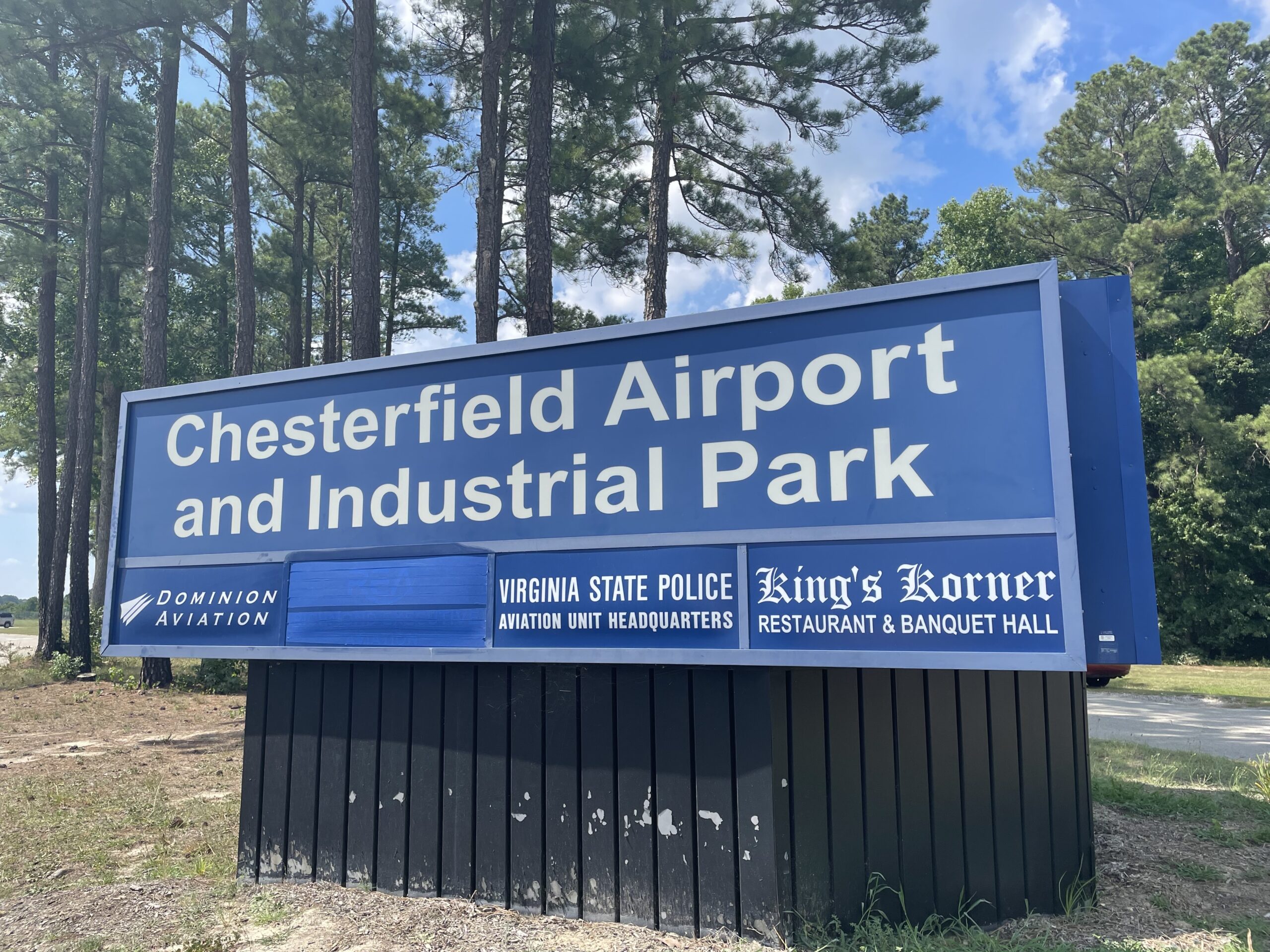
Richmond Executive Aviation operated out of two 10,000-square-foot hangars next to the airport’s terminal building. (Michael Schwartz photos)
Richmond Executive Aviation has been grounded by Chesterfield County.
The upstart firm, which was created to be a second operator at the county’s municipal airport, was ordered in recent weeks by Chesterfield officials to cease operations.
The company’s shuttering after barely a year in business has left in its wake a legal dispute between its founding CEO and main investor, has cut short a decades-long deal the company struck with the county and left two newly built hangars largely idle on the small airport’s tarmac.
In a letter from the county dated June 27, airport manager Jeremy Wilkinson said the county terminated the company’s so-called fixed-based operator (FBO) services agreement after multiple notices of default of provisions of its agreement with the county. Those provisions are known in the aviation industry as minimum standards and are encouraged by the FAA.
The violations included: not employing a sufficient number of FAA certified aircraft mechanics and flight instructors; not providing aviation fuel services; unsafe fueling practices; improperly handling contaminated fuel; and failing to have an airworthy flight multi-engine training aircraft.
“This termination is effective immediately, so please take the necessary steps to immediately cease all operations or the appearance thereof,” the letter states. “We recognize the difficulty of these circumstances and regret that REA did not succeed.”
The letter was the last straw after previous notices of default, including one in May after the company had run out of fuel to sell to customers and had no funds to refill its supply.
REA’s removal from the airport ended a brief but controversial run.
The company was created by founding CEO Mark Hackett, who first made his pitch to the county in 2017 after retiring as an airline pilot with JetBlue.
Hackett sought to launch REA as the airport’s second FBO to compete with longtime incumbent Dominion Aviation. In theory, REA proposed to focus mainly on flight instruction and cater more toward smaller general aviation customers, while Dominion Aviation focused mainly on private jet chartering and aircraft maintenance, among other services. Both firms were to compete on things like aircraft fuel sales.
Hackett brought in local businessman Wendell “Ray” Gibson, owner of industrial contractor Gibson Industrial, to be REA’s main financial backer. In 2018, amid pushback from certain supervisors and county administrators, Hackett managed to convince the board of supervisors to award REA a 30-year FBO designation and 40-year land lease on which the company’s hangars would reside.
After various delays, REA finally launched in June 2021 out of two hangars built and owned by Gibson’s 5G Air LLC.
While Hackett had forecasted financial losses in the business’s early days, various missteps outlined in court records show the firm struggled out of the gate, culminating in the sheriff’s office escorting REA employees off the premises in late June.
Those court records are a result of a lawsuit filed by Hackett against Gibson and 5G Air in Chesterfield County Circuit Court in April.
The lawsuit, which has resulted in voluminous filings and related exhibits, claims Gibson sabotaged the business by refusing to continue to fund it in its initial months. Hackett seeks more than $4.5 million in damages and sought an injunction to bar Gibson from removing funds from REA’s bank accounts.
Gibson, however, contends in court records that Hackett’s mismanagement was what ultimately caused REA’s demise and that he would no longer fund the money-losing operation. Gibson, who still has a controlling interest in the company, successfully defeated Hackett’s injunction attempt and now awaits a hearing where he’ll argue to have the case dismissed.
Hackett, reached by phone this week, blames REA’s failure on outside forces, including Gibson and various members of the county government. He claims REA was treated less favorably by the county compared to Dominion Aviation when it came to upholding minimum standards.

The airport’s terminal building houses Dominion Aviation’s offices and sits next door to where REA operated.
“The county has been lopsided in their view on REA,” Hackett said. “Our argument right now is directly with the inappropriate bias the county showed Dominion over us.”
Hackett claims REA was on an upward trajectory after winning contracts to fuel the fleets of federal and state aviation units that are housed at the Chesterfield airport. REA won that business away from Dominion Aviation in part by charging a lower price than its competitor.
“We made quite an impact, quite a mark,” Hackett said. “But impact can’t outrun politics. The only person that lost out on this is me.”
It’s unclear what, if anything, is left of REA. Gibson, who now appears to be in control of the LLC and the hangars, declined to comment through his attorney, Kenneth Stout of law firm Miles & Stockbridge.
REA’s name has been removed from the airport’s entryway signage.
Hackett is represented in the case by attorneys Terry Frank and Megan Wills of Terry Frank Law.
In response to Hackett’s claims of favoritism, Dominion Aviation founder and owner Mike Mickel said: “There is no more regulated industry than aviation. For 39 years we have been rigorously audited at the federal, state and local levels and have always maintained full compliance.”
He added, “As to the other matters, Dominion has no comment.”
Mickel, whose company has since regained the government fueling contracts it temporarily lost to REA, said it remains to be seen what will become of the empty REA hangars that sit next door to his on the tarmac. He didn’t rule out swooping in to make use of them if called upon.
“Nothing is off the table. If it makes business sense, we would consider it,” Mickel said.
The county, meanwhile, appears to still be unraveling the mess left in the wake of REA’s failure.
A prepared statement issued this week stated: “The county will continue to work with the owner of the hangars (Gibson’s 5G Air), which is a separate entity from (REA), to help position them for other aeronautical uses, such as the storage of aircraft.”
As for Hackett, 48, he said he’s now pursuing another profession. He said he’s enrolled in a pre-med program to begin to study to become an orthopedic surgeon.
“I’m ambitious,” he said. “I’m a leader at heart.”

Richmond Executive Aviation operated out of two 10,000-square-foot hangars next to the airport’s terminal building. (Michael Schwartz photos)
Richmond Executive Aviation has been grounded by Chesterfield County.
The upstart firm, which was created to be a second operator at the county’s municipal airport, was ordered in recent weeks by Chesterfield officials to cease operations.
The company’s shuttering after barely a year in business has left in its wake a legal dispute between its founding CEO and main investor, has cut short a decades-long deal the company struck with the county and left two newly built hangars largely idle on the small airport’s tarmac.
In a letter from the county dated June 27, airport manager Jeremy Wilkinson said the county terminated the company’s so-called fixed-based operator (FBO) services agreement after multiple notices of default of provisions of its agreement with the county. Those provisions are known in the aviation industry as minimum standards and are encouraged by the FAA.
The violations included: not employing a sufficient number of FAA certified aircraft mechanics and flight instructors; not providing aviation fuel services; unsafe fueling practices; improperly handling contaminated fuel; and failing to have an airworthy flight multi-engine training aircraft.
“This termination is effective immediately, so please take the necessary steps to immediately cease all operations or the appearance thereof,” the letter states. “We recognize the difficulty of these circumstances and regret that REA did not succeed.”
The letter was the last straw after previous notices of default, including one in May after the company had run out of fuel to sell to customers and had no funds to refill its supply.
REA’s removal from the airport ended a brief but controversial run.
The company was created by founding CEO Mark Hackett, who first made his pitch to the county in 2017 after retiring as an airline pilot with JetBlue.
Hackett sought to launch REA as the airport’s second FBO to compete with longtime incumbent Dominion Aviation. In theory, REA proposed to focus mainly on flight instruction and cater more toward smaller general aviation customers, while Dominion Aviation focused mainly on private jet chartering and aircraft maintenance, among other services. Both firms were to compete on things like aircraft fuel sales.
Hackett brought in local businessman Wendell “Ray” Gibson, owner of industrial contractor Gibson Industrial, to be REA’s main financial backer. In 2018, amid pushback from certain supervisors and county administrators, Hackett managed to convince the board of supervisors to award REA a 30-year FBO designation and 40-year land lease on which the company’s hangars would reside.
After various delays, REA finally launched in June 2021 out of two hangars built and owned by Gibson’s 5G Air LLC.
While Hackett had forecasted financial losses in the business’s early days, various missteps outlined in court records show the firm struggled out of the gate, culminating in the sheriff’s office escorting REA employees off the premises in late June.
Those court records are a result of a lawsuit filed by Hackett against Gibson and 5G Air in Chesterfield County Circuit Court in April.
The lawsuit, which has resulted in voluminous filings and related exhibits, claims Gibson sabotaged the business by refusing to continue to fund it in its initial months. Hackett seeks more than $4.5 million in damages and sought an injunction to bar Gibson from removing funds from REA’s bank accounts.
Gibson, however, contends in court records that Hackett’s mismanagement was what ultimately caused REA’s demise and that he would no longer fund the money-losing operation. Gibson, who still has a controlling interest in the company, successfully defeated Hackett’s injunction attempt and now awaits a hearing where he’ll argue to have the case dismissed.
Hackett, reached by phone this week, blames REA’s failure on outside forces, including Gibson and various members of the county government. He claims REA was treated less favorably by the county compared to Dominion Aviation when it came to upholding minimum standards.

The airport’s terminal building houses Dominion Aviation’s offices and sits next door to where REA operated.
“The county has been lopsided in their view on REA,” Hackett said. “Our argument right now is directly with the inappropriate bias the county showed Dominion over us.”
Hackett claims REA was on an upward trajectory after winning contracts to fuel the fleets of federal and state aviation units that are housed at the Chesterfield airport. REA won that business away from Dominion Aviation in part by charging a lower price than its competitor.
“We made quite an impact, quite a mark,” Hackett said. “But impact can’t outrun politics. The only person that lost out on this is me.”
It’s unclear what, if anything, is left of REA. Gibson, who now appears to be in control of the LLC and the hangars, declined to comment through his attorney, Kenneth Stout of law firm Miles & Stockbridge.
REA’s name has been removed from the airport’s entryway signage.
Hackett is represented in the case by attorneys Terry Frank and Megan Wills of Terry Frank Law.
In response to Hackett’s claims of favoritism, Dominion Aviation founder and owner Mike Mickel said: “There is no more regulated industry than aviation. For 39 years we have been rigorously audited at the federal, state and local levels and have always maintained full compliance.”
He added, “As to the other matters, Dominion has no comment.”
Mickel, whose company has since regained the government fueling contracts it temporarily lost to REA, said it remains to be seen what will become of the empty REA hangars that sit next door to his on the tarmac. He didn’t rule out swooping in to make use of them if called upon.
“Nothing is off the table. If it makes business sense, we would consider it,” Mickel said.
The county, meanwhile, appears to still be unraveling the mess left in the wake of REA’s failure.
A prepared statement issued this week stated: “The county will continue to work with the owner of the hangars (Gibson’s 5G Air), which is a separate entity from (REA), to help position them for other aeronautical uses, such as the storage of aircraft.”
As for Hackett, 48, he said he’s now pursuing another profession. He said he’s enrolled in a pre-med program to begin to study to become an orthopedic surgeon.
“I’m ambitious,” he said. “I’m a leader at heart.”






What in the world did the county supervisors expect? – Two guys with no experience running an FBO get a multi-decade contract to run an operation on County property without being vetted through a competitive procurement process?